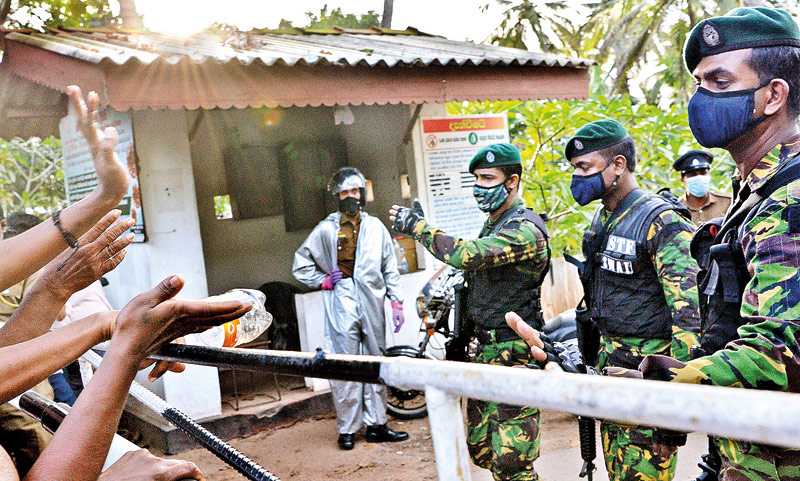Monday Feb 23, 2026
Monday Feb 23, 2026
Wednesday, 2 December 2020 00:00 - - {{hitsCtrl.values.hits}}

The Government has now decided to appoint a committee, comprising of the Ministry Secretary and other Government officials, to ascertain the reasons behind the Mahara prison riots. The lack of an independent commission has raised the concern that the true cause of the incident may not be revealed if the Government is found to be at fault – Pic by Shehan Gunasekara
“There can be no faith in Government if our highest offices are excused from scrutiny – they should be
setting the example of transparency” – Edward Snowden
 During the 2019 Presidential Election in Sri Lanka, the value of transparency and accountability were downplayed. The voters decided that national security would be the key factor in deciding the country’s 7th Executive President. And so the election of a “strong” leader has resulted in the key facets of a Democratic society, mainly those of accountability and transparency, no longer being given a pride of place.
During the 2019 Presidential Election in Sri Lanka, the value of transparency and accountability were downplayed. The voters decided that national security would be the key factor in deciding the country’s 7th Executive President. And so the election of a “strong” leader has resulted in the key facets of a Democratic society, mainly those of accountability and transparency, no longer being given a pride of place.
Transparency and national security do not go hand in hand, governments around the world are quick to deploy the argument of “for the sake of national security” when choosing to withhold information from the general public. Having enjoyed a resounding electoral victory, on the back of a campaign of the need for public safety, the Government has spent the last year systematically dismantling the safeguards for accountability.
Politicisation, constitutional amendments and disregard for the norms have resulted in the public facing the very real possibility of being left in the dark over the state of affairs in the country.
Last Wednesday (25) the President forwarded 28 names to the Parliamentary Council (PC), who were his nominees to five key independent commissions in the country, including the Election Commission and the Police Commission. As per the 20th Amendment while the President is obliged to seek the “observations” of the PC, he is now able to disregard their stance pertaining to his nominees. This sees a marked difference in the process previously followed when appointing members to these vital institutions.
Under the 19th Amendment, the previous Constitutional Council (CC) was empowered to reject the President’s nominations. This helped ensure that adequate consultation was carried out before any appointment was made. The President’s introduction of the 20th Amendment, and the subsequent curtailing of the powers of the CC, highlights the fact that oversight by Parliament is no longer considered a necessary characteristic of Sri Lanka’s Democracy.
While Parliament has been shoved aside by the Executive, the opinion of the general public has also been discarded. The names of the recent nominees to these independent commissions have been reported in the media sans any explanation behind their choice. The process has been followed, as dictated by the current laws of the country, but the public has been left in the dark over the President’s reasoning for his choices. It is only natural that these commissions will soon face a loss of confidence in the eyes of the public. With Sri Lanka’s rich history of politicising such institutions, an absence of a rationale behind these appointments will serve to heighten the public’s suspicion and apathy.
While the appointments to these commissions have been made with minimum scrutiny, it will be appointments to the Right to Information (RTI) Commission that will garner much attention. The RTI Act was introduced as a necessary piece of legislation to ensure the public was given a direct line of sight in regards the actions of the administration. With murmurings already emerging over the recent appointments, it will be little surprise that if and when the new nominations for the RTI Commission are sent, those too will be met with a sense of indifference by the public.
Of course, the absence of transparency has gone beyond appointments. Sri Lanka’s economy faced its third credit rating downgrade in the space of a year on Thursday (26) when Fitch Ratings downgraded Sri Lanka to “CCC”. Pundits have suggested that the downgrade by the international credit rating agency was in part due to the absence of the GDP figures for the 2nd and 3rd quarters of 2020. In fact that very same day the Central Bank criticised the Department of Census and Statistics for delaying the release of the figures, describing it as “unacceptable”.
Despite the Treasury condemning the recent credit rating downgrade, the Government has still not publicly presented figures to effectively counter the agencies conclusion. It was predicted previously that an absence of any official figures would leave the Government susceptible to such a downgrade. Unfortunately for the country’s economy, the authorities’ failure to be transparent in the current situation of the economy has resulted in the very thing they would have looked to avoid.
Globally economies have faced a downturn due to the ongoing COVID-19 pandemic. However, the Government’s apparent decision to push aside any negative indicators of their performance has seen a further adverse impact on the situation, with a trickle-down effect to the general public. The negative perception of the economy, as fostered by international agencies, coupled with a lack of transparency on the part of the Government will certainly impact the public’s confidence in the economy.
The avoidance of transparency, whether it is for the sake of national security or to avoid a negative reaction from the public, can oftentimes be an addictive course of action for governments. For this administration, it seems as though accountability is being shoved aside when dealing with matters that do not paint the Government in a good light.
On Monday (30) during the Parliamentary proceedings the matter of the Mahara prison riot, which occurred the day before, was raised. Responding to the questions posed by Members of the Opposition, Cabinet Minister Wimal Weerawansa told Parliament that the Government had received intelligence reports that an underworld figure was providing the prisoners with illegal drugs that were making them bloodthirsty and violent. He added that the riots were a result of underworld figures attempting to tarnish the image of the Government and bring about international disrepute.
However, it has been suggested that rather than a wild international conspiracy, the prison riots are a result of overcrowding and the uncontrolled spread of the COVID-19 virus amongst the prisoners. The State Minister of Prison Reforms, Dr. Sudarshini Fernandopulle, told Parliament that as many as 1,098 prisoners have so far tested positive for the virus. In fact it was the Government who first suggested that due to overcrowding in prisons, and the risk of a COVID-19 outbreak, they would grant pardons to many prisoners.
The Government has now decided to appoint a committee, comprising of the Ministry Secretary and other Government officials, to ascertain the reasons behind the riot. The lack of an independent commission has raised the concern that the true cause of the incident may not be revealed if the Government is found to be at fault.
While the public has chosen to select a leader for the country based on priority being given to national security, the absence of accountability has certainly taken its toll on the public. Transparency in governance is considered the cornerstone of a vibrant Democracy, the ability to question our leader’s actions is what helps ensure an elected regime does not descend into dictatorship.